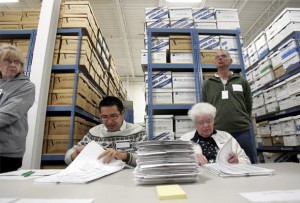More Franken Ballots Found!

Election judges Willy Lee (L) and Joanne Caspersen recount marked ballots cast for the 2008 Minnesota U.S. senate race between former Saturday Night Live comedian Al Franken (DFL-MN) and incumbent Norm Coleman (R-MN) at an elections warehouse in Minneapolis November 19, 2008. REUTERS/Eric Miller (UNITED STATES)
Since the initial counting of ballots on Election Day, caches of new Al Franken ballots have been mysteriously discovered on a regular basis. Yesterday, a few more turned up.
The U.S. Senate recount took two abrupt turns Tuesday, both boosting the prospects of DFLer Al Franken.
Franken unexpectedly picked up 37 votes due to a combined machine malfunction and human error on Election Day that left 171 Maplewood ballots safe, secure but uncounted until Tuesday’s final day of recounting in Ramsey County. Secretary of State Mark Ritchie’s office immediately asked county officials to explain what had happened, and U.S. Sen. Norm Coleman’s campaign said it sent its own experts to Ramsey County to review the situation and said it was “skeptical about [the ballots’] sudden appearance.”
 About three decades ago, then-Saturday Night Live writer and personality Al Franken jokingly asked people who weren’t itemizing their taxes to send him all their receipts since, as a TV personality, pretty much everything counted as a “business expense” for him. Now, apparently, they’re sending him ballots.
About three decades ago, then-Saturday Night Live writer and personality Al Franken jokingly asked people who weren’t itemizing their taxes to send him all their receipts since, as a TV personality, pretty much everything counted as a “business expense” for him. Now, apparently, they’re sending him ballots.
Either that, or Bock Fest started early this year and the state’s election officials are too drunk to do their jobs.
Regardless, in the addition to the mysterious appearance of ballots a month after the election, we’ve got this:
The day’s other news — which Franken’s campaign quickly described as a “breakthrough” — came when Ritchie’s office asked local election officials to examine an estimated 12,000 rejected absentee ballots and determine whether their rejection fell under one of four reasons for rejection defined in state law. The Secretary of State’s office asked that ballots that were rejected for something other than the four legal reasons be placed into a so-called “fifth category.” The fifth category, Ritchie’s office said, could also include absentee ballots rejected for reasons that were “not based on factual information.”
The “Featured Comment” at the page right now is rather salient:
This is a joke. I have gotten to the point where I have zero confidence in the way this state conducts itself when counting ballots. They have found missing ballots all over this state and I think its shameful. We are turning into a bigger embarrasement than Florida ever was. How about all the other races? Did you all count them wrong too?
It’s a fair question. In extremely close elections, we may simply not be able to get the count 100 percent right. That’s especially true when human judgment has to be applied as to whether a particular ballot is properly marked. But the continued discovery of new Franken ballots and second guessing of initial decisions mostly going Franken’s way naturally raises suspicion of foul play, even though it’s likely just a case of imperfect officials trying to do their job. Either way, though, the process is an embarrassment.
via memeorandum



I agree here 100%. The numbers being so close the race is a statistical tie, no amount of counting will result in an outcome that is any more fare then tossing a coin.
Yeah that’s what a lot of people said in 2000. but hey as long as the decisions go your way no problem. Having said that the idea of Al Franken in the senate is sort of anathema to my idea that celebrities of all stripes should be barred from seeking public office on principal. Better to use the British approach (thinking about the house of lords here), make a third branch of government, put all the politically active celebrities in it and strip it of all it’s power.
Don’t some require a run-off election when the vote hits a statistical tie? That seems most reasonable.
Any human endeavor can be improved upon given time. Counting ballots is no different than any thing else in that regard. In close elections every effort should be made to count every ballot cast. There is no need for haste, the outcome can wait.
I think the process should continue till one candidate either concedes or till no more ballots are left uncounted.
Fortunately this is not like Florida in 2000. Then we had the Republican party involved in a concerted effort to stop ballots from being counted. The effort involved party members throughout Florida, party members in Congress, and finally five Republicans on the Supreme Court who gave the election to Bush. The people who voted did not decide the election in Florida, the Republicans on the Supreme Court did.
This is nothing like that. Today both sides are staying within the rules and ballots are being counted. Let the process continue. This what democracy is all about.
I don’t recall new Bush ballots being found but that might have happened. The difference in 2000 was that Bush was ahead as a result of the original count, so that result being confirmed was status quo.
I don’t think so, but maybe. Generally, a run-off is only required if no one got a majority. Otherwise, you’re basically screwing the guy who had the lead by making him have a do-over.
In this particular case, where a significant third party candidate was in the race, I’d have preferred instant run-off voting, which allows people to vote for their first and second choice, with the latter used if no one got a majority. That, incidentally, would almost surely have resulted in an easy Franken win.
>In this particular case, where a significant
>third party candidate was in the race, I’d have
>preferred instant run-off voting, which allows
>people to vote for their first and second
>choice, with the latter used if no one got a
>majority. That, incidentally, would almost
>surely have resulted in an easy Franken win.
IRV has a number of well documented flaws, the worst of which being that it is non-monotonic (e.g. that it is possible to lose the election because too many people voted for you).
Certainly Franken isn’t complaining.
But that begs the question, foul play by whom?
Well, let’s make a gues based on who would benefit from such foul play….
even though it’s likely just a case of imperfect officials trying to do their job
Bingo. Elections are typically supervised by volunteers or underpaid officials who may perhaps have graduated from high school. States bet that they can afford to scrimp on elections because the chance of their being “that close” is a small one, and who really cares anyway?
What a travashamamockery. If this keeps up the canvasing board will need to budget for a PR firm.
Out of almost three million votes cast, less than two hundred turn up in one precinct as a result of an explainable error (and a clearly identifiable error, the basic description of which nobody seriously contests), and it’s an embarrassment? Not really. Counting this story, I have only heard about three verified stories of ballots being discovered, and the total number of ballots affected is still less than three hundred.
Most of the time, this kind of problem wouldn’t matter, but when it’s close, these problems get magnified. We’re still talking about disputes over a very small percentage of votes cast; I think that the process has worked pretty well.
“How can you cheat for me, Al Franken?”
What’s subtlety and nuance doing on a conservative site? Haven’t you read Powerline? Little Green Footballs? The Corner? Hugh Hewitt? Sean Hannity? Here, let me rewrite that to make it ‘conservative’:
There you go. Now it’s conservative.
Ken, you history rewriter you. Republicans just wanted the same count everywhere which the recount law in the state required. Democrats and the democratic controlled Florida Supreme court only wanted to count votes in places where democrats might win. There was no established standard for the recount. The US Supreme court said not the the BS. That said. When the number of votes found and counted exceeds the number of people who could vote in the district. Democrats have been there. Al Franken is a foul POS. It is fitting Democrats support him here.
Anderson, what level of college were you at before you learned to count. I could count before I reached the first grade. By the time I graduated High School Calculus was the level of math. What logarithms would you use to count simple votes?
CONGRATULATIONS, You’ve won the Most Misleading Headline of the Day Award.
Excuse me, but there were 171 uncounted ballots because of a ballot-counting-machine malfunction on Election Day. Franken got 91 of the total, 54 Norm Coleman and 26 for other candidates. So, if your glass is half empty, the headline could be More Coleman Ballots Found !
At best, shouldn’t the headline be MN Count Continues, Franken Gains 37 Votes.
The implication is that only Franken has gained in the process. Franken and Coleman have both seen their totals change. Of course, the other implication is the acknowledgement that since these voters were “foundâ€, they must have been “lost†… I guess, everyone should be glad that there are found.
Regarding the evaluation of absentee ballots, this may be the “good news†of this election as it exposes a problem that needs to be corrected.
If you go in person to vote, the registration is checked and you are given a ballot. If there is a problem with the registration, that can be corrected right then and there. If you leave without casting a ballot, you know the reason why.
If you submit an absentee ballot, you do not know if your ballot was accepted. Although absentee ballots did not have to be returned until Election Day, most people did return them early. At that time, the election clerks reviewed and rejected ballots, but DID NOT tell the voter that the ballot was rejected, or why it was rejected. For example, some of the ballots were rejected for lack of a signature in the proper spot; those could have easily been corrected.
It is the rejected absentee voters that are truly the losers … not Norm Coleman or Al Franken … they thought their votes would count, but because of a correctable judgment by many election clerks, their vote didn’t count..
Makes me feel just like Jeanie Dixon……
But let’s face it… It ain’t that hard,now is it?
I dunno.
Wouldn’t that kinda require a sex change operation?
The statement “But the continued discovery of new Franken ballots” is a bit misleading. The article said 171 uncounted ballots were found; 104 ballots were for Fraken, but the balance of 67 were for Coleman. Why not say “But the continued discovery of new Coleman ballots”?
If the lost ballots keep favoring Franken, then one of two questions must be asked; Where are these “lost” ballots coming from, i.e., are they a plant? If they are not a plant, then why did a pool of votes that favored Franken get lost in the first place.
Uh, because it would look extra suspicious if all the “found” ballots were votes for Franken?
Scary stuff with all these Frankenballots and Werevotes running around unchecked.
haven’t been following the story have you. there has been a lot of “oh look, al got more votes today” going on. this isn’t the first time he has magically picked up votes. there were also votes in the backseat of an election officials car, a mis-placed zero, etc all of which favored franken. people say its suspicious bc it is, kos kid.
Yeeesh, great a borda count.
Instant run-off basically allows people to both express their 1st choice preference and their realistic fallback. So, you could vote Libertarian or Lizard People or whatever as your first choice and, failing a majority voting for anyone, you’d then go to votes for the first two candidates plus second choice votes from those who voted for candidates 3-5.
Allow me to provide a more explicit example of the problems with IRV:
Suppose there are three candidates, and we get the following votes:
9 B>C>A
8 A>B>C
7 C>A>B
In the first run off round eliminates candidate C, leading to:
9 B>A
15 A>B
So A wins. Now, consider instead:
6 B>C>A
3 A>C>B
8 A>B>C
7 C>A>B
Notice the only change is that three of the B>C>A voters changed to A>C>B. Now the first round eliminates B:
13 C>A
11 A>C
So C wins. So more people voted for A, without changing their view of C, and that caused A to lose the election and C to win.
Not sure why that’s a problem.
11 people preferred A, 14 preferred someone other than A. Eliminating the third choice, 11 preferred A, 7 preferred C, and six have their vote reallocated to their second choice, C, pushing him over the top.
Let’s substitute real names.
6 Nader Gore Bash
3 Bush Gore Nader
8 Bush Nader Gore
7 Gore Bush Nader
Nader gets eliminated leaving
11 Bush first choice
7 Gore first choice
6 Gore second choice
Gore wins 13-11
Why is that a bad outcome?
>Why is that a bad outcome?
You’re forgetting there’s two parts to the example. If the Nader voters had voted their actual preferences (Nader Gore Bush) Bush would had one. While they certainly prefer Gore winning, the only way that happened was because a third of the Nader voters lied and said Bush was their favorite candidate. Moreover, it was the fact that Bush got a third of the Nader voters to vote for him that caused him to lose. So Bush would have been better off telling people NOT to vote for him.
A voting system where 1) voters gain strategic advantage from lying about their actual preferences and 2) politicians gain strategic advantage telling people not to vote for them can only be described as perverse.